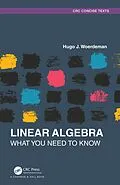There is good reason to be excited about Linear Algebra. With the world becoming increasingly digital, Linear Algebra is gaining more and more importance. When we send texts, share video, do internet searches, there are Linear Algebra algorithms in the background that make it work.
This concise introduction to Linear Algebra is authored by a leading researcher presents a book that covers all the requisite material for a first course on the topic in a more practical way.
The book focuses on the development of the mathematical theory and presents many applications to assist instructors and students to master the material and apply it to their areas of interest, whether it be to further their studies in mathematics, science, engineering, statistics, economics, or other disciplines.
Linear Algebra has very appealing features:
.It is a solid axiomatic based mathematical theory that is accessible to a large variety of students.
.It has a multitude of applications from many different fields, ranging from traditional science and engineering applications to more 'daily life' applications.
.It easily allows for numerical experimentation through the use of a variety of readily available software (both commercial and open source).
Several suggestions of different software are made. While MATLAB is certainly still a favorite choice, open-source programs such as Sage (especially among algebraists) and the Python libraries are increasingly popular. This text guides the student to try out different programs by providing specific commands.
Autorentext
Hugo J. Woerdeman, PhD, professor, Department of Mathematics, Drexel University, Philadelphia, Pennsylvania, USA, is also the author of Advanced Linear Algebra, published by CRC Press, and co-author of Matrix Completions, Moments, and Sums of Squares, published by Princeton University Press. He also serves as Vice President of two societies of researchers: The International Linear Algebra Society and The International Workshop on Operator Theory and its Applications.
Klappentext
This book is intended for a first linear algebra course. The text includes all essential topics in a concise manner and can therefore be fully covered in a one term course. After this course, the student is fully equipped to specialize further in their direction(s) of choice (advanced pure linear algebra, numerical linear algebra, optimization, multivariate statistics, or one of the many other areas of linear algebra applications).
Linear Algebra is an exciting area of mathematics that is gaining more and more importance as the world is becoming increasingly digital. It has the following very appealing features:
- It is a solid axiomatic based mathematical theory that is accessible to a large variety of students.
- It has a multitude of applications from many different fields, ranging from traditional science and engineering applications to more 'daily life' applications (internet searches, guessing consumer preferences, etc.).
- It easily allows for numerical experimentation through the use of a variety of readily available software (both commercial and open source).
This book incorporates all these aspects throughout the whole text with the intended effect that each student can find their own niche in the field.
Several suggestions of different software are made. While MATLAB is certainly still a favorite choice, open source programs such as Sage (especially among algebraists) and the Python libraries are increasingly popular. This text guides the student through different programs by providing specific commands.
Inhalt
Table of Contents
Preface
1 Matrices and Vectors
2 Subspaces in Rn, basis and dimension.
3 Matrix Algebra
4 Determinants
5 Vector Spaces
6 Linear Transformations
7 Eigenvectors and Eigenvalues
8 Orthogonality
Appendix
Index
